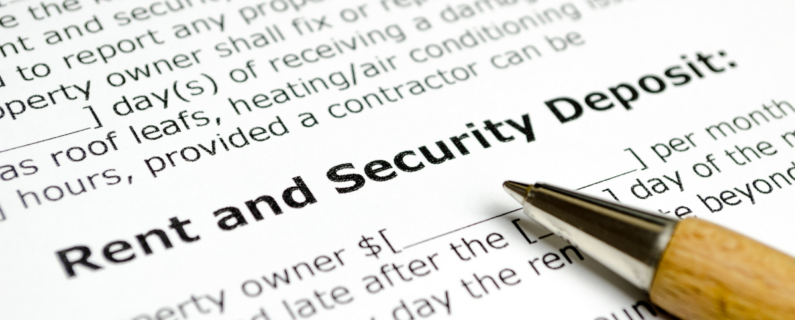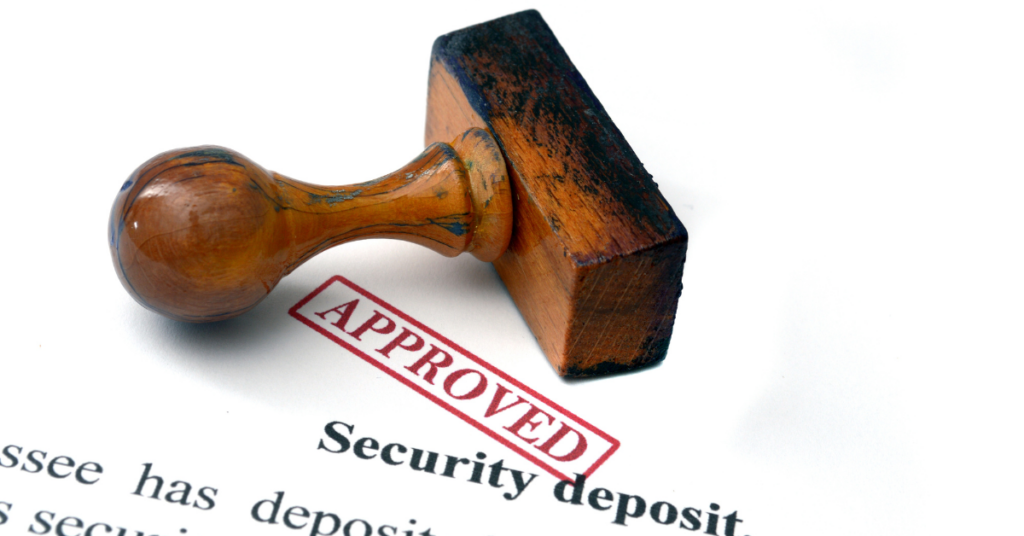
Returning a security deposit can be a headache for both landlords and tenants. When a tenancy ends, the process of getting back a security deposit often needs to be clarified and resolved. Whether it’s unpaid rent, damages, or disagreements over normal wear and tear, the challenges of security deposit returns can be overwhelming.
Many tenants expect to get their security deposit back in full, only to find that deductions have been made for various reasons. These deductions can include repair costs for broken windows or large holes, unpaid back rent, or even cleaning fees. Sometimes, landlords fail to return the security deposit within the state’s laws, leading to further frustration.
For landlords, the challenge lies in determining what constitutes normal wear and tear versus actual damages. They must also follow legal requirements for returning the deposit, such as providing an itemized statement and returning the funds in a timely manner. Failing to comply with these requirements can result in disputes that might end up in small claims court.
In this blog, we will learn more about the security deposit returns in rental agreements, shedding light on both parties’ common issues and providing insights into potential solutions.
Role of Security Deposits in Rental Agreements
Security deposits play a crucial role in rental agreements, serving as a financial safety net for landlords. When tenants move into a rental unit, they typically pay a security deposit, often equivalent to one month’s rent. The landlord holds this deposit to cover any unpaid rent, damages beyond normal wear and tear, or other breaches of the lease agreement.

Protecting the Property
Landlords use security deposits to protect their rental property. If a tenant fails to pay rent or causes damage, the landlord can deduct these costs from the security deposit. For example, broken windows or large holes in the walls are common reasons for security deposit deductions. However, deductions cannot be made for normal wear and tear, which includes minor scuffs on the walls or worn carpets due to regular use.
Legal Guidelines
Security deposit laws vary by state, but most states require landlords to return the security deposit within a specific time limit after the tenancy ends. The landlord must provide an itemized list of deductions detailing any repairs or unpaid rent covered by the deposit. This itemized statement should be sent to the tenant’s forwarding address via certified mail.
Tenant’s Responsibilities
Tenants must give proper notice before moving out, typically specified in the lease agreement. Failing to do so can result in the landlord deducting a portion of the security deposit for unpaid rent or other costs associated with re-renting the property. It’s essential for tenants to understand their lease or rental agreement to avoid disputes over security deposits.
Disputes and Resolutions
Disputes over security deposits are common. If a landlord fails to return the deposit in a timely manner or makes deductions in bad faith, tenants can take legal action in small claims court. Tenants can also send a demand letter requesting the return of their deposit if they believe the landlord acted improperly.
Ensuring a Smooth Return
To ensure the security deposit is returned without issues, tenants should:
- Pay all rent and fees on time.
- Maintain the rental property and avoid causing damage.
- Provide proper notice before moving out.
- Attend the final inspection with the landlord to agree on any proposed deductions.
- Leave the rental unit clean and in good condition.
Interest and Accounts
In some states, landlords must place security deposits in an interest-bearing account. At the end of the lease period, the tenant is entitled to the deposit plus any accrued interest. State laws determine how this interest is handled and what tenants can expect upon moving out.
Landlord-Related Challenges in Deposit Returns
Returning a security deposit to tenants can sometimes be challenging for landlords. Here are some common issues that landlords may face in the process.
Disputes over Deductions
Landlords may deduct money from the security deposit for damages they attribute to the tenant. However, disagreements can arise over whether the damages were:
- Pre-existing
- Normal wear and tear
- Tenant’s responsibility
Incomplete Documentation
If landlords thoroughly document the property’s condition before and after the lease term, it becomes easier to justify any deductions from the security deposit. Incomplete or unclear records may lead to disputes.
Timeliness of Deposit Refunds
Some landlords may delay the return of the security deposit, either intentionally or due to administrative issues. This can frustrate tenants who expect a timely return of their funds.
Failure to Provide Itemized Deductions
Landlords must typically provide a list of deductions or itemized statements and any remaining balance when returning the security deposit. Failure to do so can lead to legal consequences.
Understanding Local Laws
Landlords must be aware of and comply with local security deposit laws. Different jurisdictions may have specific regulations regarding:
- The amount of the deposit
- Allowable deductions
- Timeline for returning the deposit
Tenant-Related Challenges in Deposit Returns
Tenants may also face deposit return problems in the long run. Some of the common tenant-related challenges include:
Communication Issues
Tenants may need to communicate with the landlord regarding damages or repairs needed during their tenancy. Clear communication is essential to avoid misunderstandings when the lease term ends.
Failure to Document Pre-existing Issues
Tenants should document any pre-existing damages or issues with the property at the beginning of the lease. Failure to do so can make it difficult to prove that certain damages were not caused by the tenant, leading to potential deposit deductions.
Unpaid Rent or Fees
Unpaid rent, utility bills, or other fees can be deducted from the security deposit. Tenants who leave outstanding balances may find a portion or all of their deposit used to cover these costs.
Non-compliance with the Lease Agreement
If tenants violate the terms of the lease agreement, landlords may be entitled to make deductions from the security deposit. Common violations include:
- Unauthorized pet ownership
- Subletting without permission
- Property damage caused by negligence
Lack of Understanding of Tenant Rights
Tenants may need to be fully aware of their rights regarding security deposits, including the right to receive an itemized list of deductions and the timeframe within which the deposit should be returned.
Nevada State-Specific Deposit Laws

Based on the Nevada Legislation, NRS 118A.242 outlines regulations related to security deposits in landlord-tenant relationships. Key points include:
- Limitation on Amount: The landlord cannot demand a security deposit, surety bond, or their combination exceeding three months’ periodic rent.
- Surety Bond Option: With landlord consent, tenants can purchase a surety bond instead of paying part or all of the security deposit. The bond covers rent default, premises damage (excluding normal wear and tear), and cleaning obligations.
- Landlord Discretion: Landlords are not obligated to accept surety bonds, and tenants cannot be compelled to purchase them instead of a security deposit.
- Usage of Security Deposit: Upon tenancy termination, the landlord can only use the security deposit for specific purposes, such as rent default, repairs beyond normal wear and tear, and cleaning costs. The landlord must provide an itemized written account of how the deposit is used within 30 days.
- Tenant Dispute Rights: If a tenant disputes an item in the landlord’s itemized account, the tenant can send a written response to the surety within 30 days. The surety can only report the claim to a credit agency if they obtain a judgment against the tenant.
- Failure to Return Deposit: Suppose the landlord fails to return the remaining security deposit within 30 days after the tenancy ends. In that case, the landlord may be liable to the tenant for damages equal to the entire security deposit, with the court determining an additional sum based on the landlord’s good faith, conduct, and harm to the tenant.
- Prohibited Provisions: Rental agreements cannot contain provisions making security deposits nonrefundable or waiving/modifying tenant rights under this section.
- Tenant Priority: A tenant’s claim to a security deposit precedes any claims by the landlord’s creditors.
Why Hire An Expert Property Manager for Seamless Security Deposit Returns
Security deposits cover potential damages and unpaid rent, and ensure the rental unit is returned in good condition. However, disputes often arise over deductions, normal wear and tear, and timely deposit return.
Hiring a property manager simplifies the process. They handle everything from ensuring compliance with security deposit laws to managing the final inspection and itemized statement. This professional management prevents misunderstandings and protects both parties’ interests, ensuring a fair and smooth return of the security deposit.
For landlords in Las Vegas, Faranesh Real Estate and Property Management offers expert services to streamline security deposit returns and manage your property efficiently. Contact us today to ensure your rental property is handled with the utmost care and professionalism.



